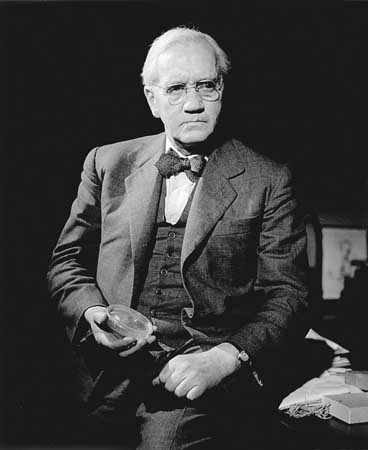Fleming, Sir Alexander
Scottish bacteriologist
born August 6, 1881, Lochfield, Ayr, Scotland
died March 11, 1955, London, England
 Scottish bacteriologist whose discovery of penicillin (1928) prepared the way for the highly effective practice of antibiotic therapy for infectious diseases. Fleming shared the Nobel Prize for Physiology or Medicine in 1945 with Ernst Boris Chain (Chain, Sir Ernst Boris) and Howard Walter Florey (Florey, Howard Walter Florey, Baron), who both (from 1939) carried Fleming's basic discovery further in the isolation, purification, testing, and quantity production of penicillin.
Scottish bacteriologist whose discovery of penicillin (1928) prepared the way for the highly effective practice of antibiotic therapy for infectious diseases. Fleming shared the Nobel Prize for Physiology or Medicine in 1945 with Ernst Boris Chain (Chain, Sir Ernst Boris) and Howard Walter Florey (Florey, Howard Walter Florey, Baron), who both (from 1939) carried Fleming's basic discovery further in the isolation, purification, testing, and quantity production of penicillin.After taking his degree at St. Mary's Hospital Medical School, London University (1906), Fleming conducted experiments to discover antibacterial substances that would be nontoxic to human tissues. He continued his research while serving with distinction in the Royal Army Medical Corps in World War I. In 1918 he returned to research and teaching at St. Mary's, where he was professor of bacteriology from 1928 to 1948, when he became professor emeritus.
In 1921 Fleming identified and isolated lysozyme, an enzyme found in certain animal tissues and secretions, such as tears and saliva, that exhibits antibiotic activity. While working with staphylococcus bacteria in 1928, Fleming noticed a bacteria-free circle around a mold growth (spores of Penicillium notatum) that was contaminating a culture of the staphylococci. Investigating, he found a substance in the mold that prevented growth of the bacteria even when it was diluted 800 times. He called it penicillin. Fleming found that penicillin is nontoxic but that it inhibits the growth of many types of disease-causing bacteria. He was aware of the significance of his discovery, but he lacked the necessary chemical means to isolate and identify the active compound involved. He obtained enough penicillin to use on humans topically for skin and eye infections. It was not until 11 years later in 1939, during World War II, that the pressing need for new antibacterial drugs provided the impetus for Chain and Florey's active development of penicillin.
Fleming was elected a fellow of the Royal Society in 1943 and knighted in 1944.
Additional Reading
Two biographies are Laurence James Ludovici, Fleming, Discoverer of Penicillin (1952); and Gwyn Macfarlane, Alexander Fleming, the Man and the Myth (1984).
- 2006 Earth Perihelion and Aphelion
- 2007 Earth Perihelion and Aphelion
- 2007 Human Spaceflight Launches and Returns
- 2007) Notable Civil Engineering Projects (in work or completed
- 2008 Earth Perihelion and Aphelion
- 2008 Final major league standings
- 2008 Final medal rankings, Beijing Olympic Games
- 2008 Human Spaceflight Launches and Returns
- 2008) Notable Civil Engineering Projects (in work or completed
- 2008 World Series
- 2009 Earth Perihelion and Aphelion
- 20 brightest stars
- 20 nearest stars
- 21-centimetre radiation
- 24
- 25 Largest U.S. Banks
- 26th of July Movement
- 2e cardinal de Guise, Louis II de Lorraine
- 2e duc de Bourbon, Pierre I
- 2e duc de Noailles, Anne-Jules
- 2e prince de Condé, Henri I de Bourbon
- 2nd Baron Berners, John Bourchier
- 2nd Baronet Beecham, Sir Thomas
- 2nd Baronet Benn, Sir Ernest John Pickstone
- 2nd Baronet Congreve, Sir William